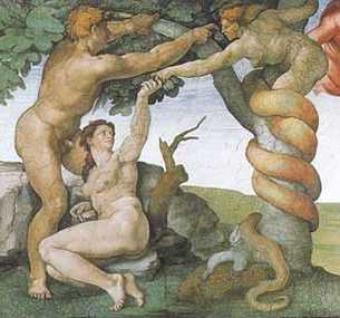<<GotoNote

The Garden of Eden (Hebrew גַּן עֵדֶן, Gan ʿEḏen), also called Paradise, is the biblical "garden of God" described in the Book of Genesis and the Book of Ezekiel.[2][3] Genesis 13:10 refers to the "garden of God",[4] and the "trees of the garden" are mentioned in Ezekiel 31.[5][5] The Book of Zechariah and the Book of Psalms also refer to trees and water without explicitly mentioning Eden.[6]
The name derives from the Akkadian edinnu, from a Sumerian word edin meaning "plain" or "steppe", closely related to an Aramaic root word meaning "fruitful, well-watered".[3] Another interpretation associates the name with a Hebrew word for "pleasure"; thus the Douay-Rheims Bible in Genesis 2:8 has the wording
"And the Lord God had planted a paradise of pleasure" rather than "a garden in Eden". The Hebrew term is translated "pleasure" in Sarah's secret saying in Genesis 18:12.[7]
Like the Genesis flood narrative, the Genesis creation narrative and the account of the Tower of Babel, the story of Eden echoes the Mesopotamian myth of a king, as a primordial man, who is placed in a divine garden to guard the Tree of Life.[8] The Hebrew Bible depicts Adam and Eve as walking around the Garden of Eden naked due to their innocence.[9]
The location of Eden is described in the Book of Genesis as the source of four tributaries. The Garden of Eden is considered to be mythological by most scholars.[10][11][12][13] Among those that consider it to have been real, there have been various suggestions for its location:[14] at the head of the Persian Gulf, in southern Mesopotamia (now Iraq) where the Tigris and Euphrates rivers run into the sea;[15] and in Armenia.[16][17][18]
The second part of the Genesis creation narrative, Genesis 2:4-3:24, opens with YHWH-Elohim (translated here "the LORD God", see Names of God in Judaism) creating the first man (Adam), whom he placed in a garden that he planted "eastward in Eden".[19] "And out of the ground made the Lord God to grow every tree that is pleasant to the sight, and good for food; the tree of life also in the midst of the garden, and the tree of knowledge of good and evil."[20]
...https://en.wikipedia.org/wiki/Garden_of_eden